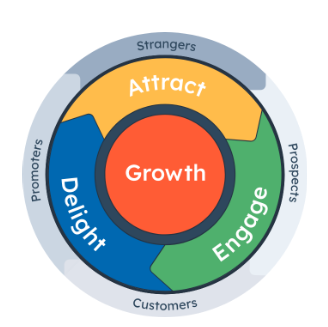THE DEFINITIVE GUIDE
TO CHOOSING AN INBOUND MARKETING AGENCY

We are here to help guide you along your journey in choosing an inbound marketing agency.
Choosing the right inbound marketing agency can be a challenge. The goal of inbound marketing is to attract potential customers to your company through a variety of digital channels, like social media, search engines, and your website, and convert them into leads, customers, and promoters of your business.
The process of inbound marketing involves:
- Attracting: Attracting strangers to your website and turning them into visitors by creating valuable and useful content that answers their questions and meets their needs.
- Converting: Converting visitors into leads by providing them with a way to exchange their contact information for a valuable offer or something they want, such as a white paper, a free trial, or a webinar.
- Closing: Closing leads into customers by nurturing them through personalized email campaigns, targeted messaging, and special offers.
- Delighting: Delighting customers by providing great service and experiences that encourage them to become promoters of your business and help you attract more customers

What’s Included in this Guide
Choosing an agency is a long-term investment, so take your time and do your research to ensure you find an agency that is the right fit for your business. That’s why we created this guide. In this guide, we answer the following questions on the way toward helping you choose the right inbound marketing agency for your business needs.
Table of Contents:
- What is Marketing?
- What Are the Different Types of Marketing Agencies?
- What is Inbound Marketing and How Is It Different?
- How Do I Pick the Right Inbound Marketing Agency?
What Is Marketing? What is B2B Marketing?
Marketing refers to the strategies, tactics, and techniques used by a company to promote its products or services to other businesses or organizations. B2B marketing is typically focused on building relationships with other businesses and decision-makers in order to sell products or services to them. This can include tactics such as market research, direct mail campaigns, trade shows, and networking events.
In this guide, we look at marketing in general and B2B marketing specifically. We answer the questions:
- What is the Purpose of Marketing?
- How Do I Know What Type of Marketing I Need?
- How Do I Create a Marketing Strategy?
- Why Should I Hire a Marketing Agency?
- How Do I Choose the Right Marketing Agency?
What Are the Different Types of Marketing Agencies ?
A marketing agency is a company that provides marketing services to businesses and organizations. These services can include market research, advertising, public relations, event planning, and more. The goal of a marketing agency is to help clients achieve their marketing objectives, such as increasing brand awareness, generating leads, or boosting sales.
Marketing agencies typically have a team of professionals with expertise in different areas of marketing, such as strategy, creative, research, and media buying. They work with clients to understand their business, target market, and goals, and then develop and execute a plan to achieve those goals.
Marketing agencies can be full-service or specialize in specific areas such as digital marketing, creative services, public relations, or event planning. They can work with clients on a project basis or provide ongoing support.
There are many different types of marketing agencies, each with their own areas of focus and expertise. Some agencies may specialize in a particular marketing discipline, such as SEO or PPC or inbound marketing or growth services, and some may specialize in a particular industry or sector, such as healthcare or technology.
To help you sort it all out and understand which agency might be best for you, we take a look at the following types of agencies and define their strengths and weaknesses.
- What is a Digital Marketing Agency?
- What is an Inbound Marketing Agency?
- What is a Growth Marketing Agency?
- What is a Social Media Agency?
- What is an Advertising Agency?
- What is an Account-Based Marketing Agency?
- What is a Public Relations Agency?
What Is Inbound Marketing and How Is it Different?
Inbound marketing is a methodology for attracting, engaging, and delighting customers by creating valuable content and experiences tailored to them. Inbound marketing uses a variety of digital channels such as search engine optimization (SEO), social media, content marketing, email marketing, and marketing automation to attract, engage and delight customers.
Unlike traditional outbound marketing, which uses interruption-based tactics like cold-calling and advertising to reach potential customers, inbound marketing focuses on creating and distributing valuable content that pulls people towards your brand and earns their trust.
Inbound marketing is different from traditional marketing in several ways:
- Approach: Inbound marketing is a pull approach, meaning that it attracts customers to you, by providing valuable content and experiences tailored to them. On the other hand, traditional marketing is a push approach, meaning that it interrupts customers with advertising messages and promotions, regardless of whether they are looking for them or not.
- Channels: Inbound marketing uses digital channels such as search engines, social media, and content marketing to reach customers, whereas traditional marketing uses channels such as television, radio, and print advertising to reach customers.
- Measurement: Inbound marketing can be easily measured by tracking website traffic, lead generation, and conversions, allowing you to see which tactics are working and which aren't. Traditional marketing is often harder to measure, making it more challenging to determine the return on investment (ROI) of a campaign.
- Personalization: Inbound marketing allows for personalization at scale, through the use of marketing automation, CRM and personalization techniques, which enable the creation of tailored experiences for different customer segments and personas. Traditional marketing is generally less personalized, with a one-size-fits-all approach.
- Cost: Inbound marketing is often more cost effective than traditional marketing, as it allows you to reach customers where they are, rather than paying for expensive advertising space or airtime.
Inbound marketing is a holistic, data-driven, and customer-centric approach that focuses on creating valuable content and experiences that pull people towards your brand, while traditional marketing is an interruption-based approach that pushes your message to a wide audience regardless of their interests or needs.
In this Guide, we answer the following questions to help you know if inbound marketing is right for you:
How to Pick the Right Inbound Marketing Agency
A good inbound marketing agency is one that helps businesses attract, engage, and delight customers through the creation of valuable content and experiences tailored to them. The following are key characteristics that define a good inbound marketing agency:
- Experience: A good inbound marketing agency should have a track record of delivering results for businesses in your industry or a similar one. Look for an agency with a portfolio of successful inbound marketing campaigns and a clear understanding of the latest trends and best practices in the industry.
- Strategy: A good agency should have a solid understanding of your business and be able to develop a comprehensive inbound marketing strategy that aligns with your goals and objectives.
- Execution: A good agency should be able to execute the inbound marketing strategy effectively, by creating quality content, optimizing your website for SEO, and using various digital channels such as social media, email marketing, and marketing automation to engage and convert leads.
- Metrics and Analytics: A good agency should be able to track and measure the performance of your inbound marketing campaigns, and use the data to optimize and improve your results. They should be able to provide regular reports and insights that demonstrate the ROI of your campaigns and the progress towards your goals.
- Communication and Collaboration: A good agency should be easy to communicate and collaborate with, and be responsive to your needs and concerns. They should be willing to work closely with you to achieve your goals and be open to feedback and suggestions.
- Continuing education: A good agency should be committed to staying up to date with the latest inbound marketing trends, technologies, and best practices, and be willing to share that knowledge with their clients.
- Adaptability: A good agency should be able to adapt to the ever-changing digital landscape and be able to pivot their strategy as needed to ensure the best results for their clients.
To help you with the decision of picking an inbound agency, we look at the following topics:
- How Do I Choose an Inbound Marketing Agency?
- Should I Choose a National or Local Inbound Marketing Agency?
Get the Expert Marketing Advice You Need
Schedule a free no-obligation assessment today to get insights and advice from an inbound marketing expert.


